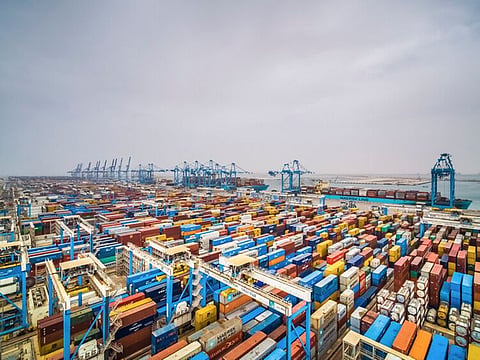In Dubai, terminal handling charges at Jebel Ali Port must be settled only via Trade Portal
From Nov 1, local shippers can settle terminal handling charges only on Dubai Trade Portal

Dubai: In another move to bring greater transparency to the local shipping and logistics sector, all Terminal Handling Charges must be settled only through the Dubai Trade Portal from November 1.
This applies to shipments directed into and through Jebel Ali Port.
The move closely follows a directive issued by Dubai Maritime Authority - in May last - for logistics companies in the emirate to submit their local port handling tariffs to the government entity.
And, most importantly, not to raise them unless the company receives specific clearance from the Authority.
The intention is to standardize local port and container handling charges in Dubai where possible.
How the new system works
Logistics companies in Dubai will charge clients directly, and the local port operator will issue invoices separately for the provided services.
“This would cover terminal handling as well as truck loading and unloading charges,” said Haris Shaikh, Managing Director at Dubai-based Gallop Shipping. “And the payments will be collected directly via the Dubai Trade Platform.
Dubai Maritime Authority’s aim was to enhance the transparency and cost-visibility of local sea container charges, which can ultimately help the economy and enhance Dubai’s status as a maritime hub.

“With the implementation of the Dubai Maritime Authority ruling, the charges would now become transparent, thereby cutting down some of the other charges.
“Dubai has been the hub for trade, and this new approach to enhancing the transparency of local sea container charges will increase its competitiveness.”
Submission deadline
June 30 was the deadline by when shipping and logistics businesses had to submit their local sea container tariffs. (These charges apply to the various costs that clients were billed for services rendered at the port.)
“Everyone had to submit their local charges and the authorities came back with corrections on some charges,” said Usman Rehman, Managing Director of Time World Freight.
“While we can’t say there was a significant drop after the Maritime Authority directive, what we did see was charges became standardized across the Dubai market.”
New charges
* Terminal Handling Charges: Dh700 for 20-feet container and Dh1,100 for 40-feet Truck Loading & Unloading Charges: Dh314 These need to be paid direct through the Trade Portal. Earlier rates * Terminal Handling Charges: Dh1,090 for 20-feet and Dh1,520 for 40-feet These were being paid to the shipping line.
The intention, industry sources say, was to ensure the most competitive rates were on offer at all times. Plus, once the rates standardized, it was up to the clients to decide which company to sign up for their logistics needs.
“What Dubai Maritime Authority did was remove the grey areas on how local sea container charges were billed,” said an industry source. “It’s been working well and delivering the results everyone had been hoping for.”
Prior approvals
If service providers find it necessary, they ‘may’ increase sea container rates ‘strictly to reflect’ new or increased costs issued by the port operator or government.
“This gives customers or freight forwarders the opportunity to move cargo on a contract basis, as any cost fluctuation can be brought under control to an extent,” said Sheikh.
Effective November 1, terminal handling and port charges will be billed by Dubai Trade directly. We hope it will be reflected in the bill of entry itself.

Bring about rate uniformity where possible
Since 2020, global container shipping rates had surged after Covid disrupted supply chains. That run had lasted until December 2022. Since then, those rate highs have subsided.
According to Usman Rehman of Time World Freight, the Dubai Maritime Authority’s move to bring uniformity - and transparency - to local sea container charges will remove any tendency to ‘over-price’.
“Look, much of the container rates into the UAE are dependent on demand fluctuations at the port of origin,” said Rehman.
“But what Dubai has done is bring to control to rate setting at the local level, and remove any ‘over pricing’ tendency on export shipping charges and local logistics costs. That in itself is a big step.”
Sign up for the Daily Briefing
Get the latest news and updates straight to your inbox







